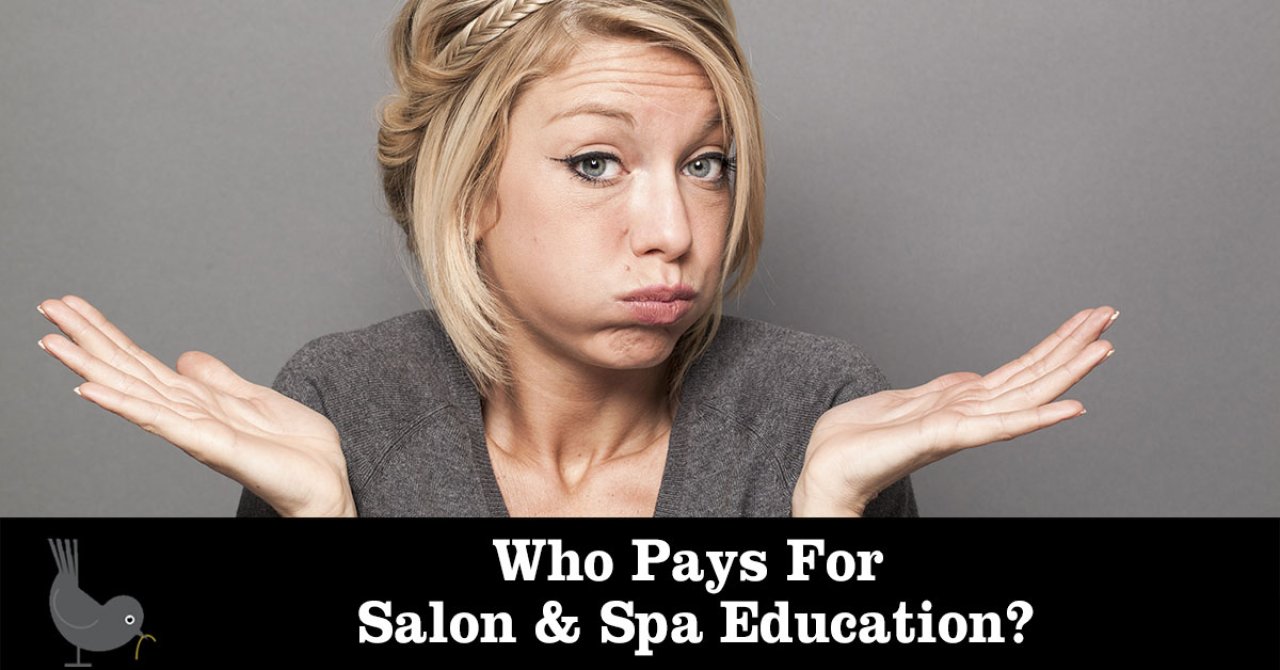Who Pays for Salon & Spa Education?

I have a reputation for telling salon/spa owners what they need to hear ... not what they want to hear.
What you are going to read here is sure to open a massive can of worms.
But you need to read it.
How we got here:
For over 40+ years, I've been saying that the old commission business model feeds the thinking and behaviors that you don't want in your salon/spa.
Many listen, learn, implement and believe in my Team-Based Pay business model and know what true next level success is all about.
Of course, there are those so imbedded in the old business model that say, "It won't work." But the TBP business model does work.
Commission is simply a "you get a piece - I get a piece" pay system. Do more, make more. Sell more, make more. Hustle more, make more. Learn more, make more.
The salon/spa industry is now in the era of rental and suites.
It is the end of the "I/me/mine" commission rainbow. Today, employee-based salon/spa owners are asking, "Where's my pot of gold?" The answer is simply … you were chasing the wrong rainbow.
Line items on your Profit and Loss Statement:
- Commission created the need for product-cost deductions and service charges because commission rates were unsustainable.
- For education … commission morphed into "you pay half - I'll pay half".
FACT: Service payroll, professional product cost, support staff and education are separate line items on a Profit and Loss Statement. Each line item must be controlled and managed with its own decision-making process based on needs and budget.
Your company's PROMISE to its customers:
- A salon/spa business is a functioning entity that produces or sells a product or service.
- To attract clients and succeed, a salon/spa business must represent something special that distinguishes itself from the competition. This is called "brand identity."
- Your salon/spa brand represents a PROMISE to consistently deliver a level of quality service and technical skill that can never be compromised.
- It is the salon/spa's (aka the company) responsibility to ensure that all service and support staff can deliver the company's promise to its customers.
Item #4 is where the salon/spa commission model took a wrong turn. The model says, "If you want education … I'll pay half."
- What if the employee can't afford to pay for half of the education?
- What if the employee thinks his or her work is just fine as is?
- What if you know the employee can't deliver your salon/spa's brand promise to its customers and you allow it to continue?
FACT ONE: Your salon/spa's brand promise can never be compromised.
FACT TWO: Pushing the education burden and decision-making process onto employees compromises your brand promise.
Education has to be mandatory:
In a highly technical and skill based service business like salons/spas … ongoing education is a non-negotiable.
FACT: Client expectations are set by your brand reputation and image. They don't lower those expectations because you hired young talent and charge less because they're less experienced.
If you want to succeed today, technical and customer service education is mandatory. It's a company decision … not an employee option.
How will you pay for it?:
By now, the question burning in your head must be, "How do I pay for or fund education?"
I've seen owners try all sorts of tactics like putting retail profits into an education fund that employees can draw on. But that brings up another challenge. What if the employee sucks at retail? Not only does the employee need technical skill education, he or she needs retail selling education?
Okay, if education is a line item on your Profit and Loss Statement, how will you fund that line item if there's barely any profit now?
- If there's barely any profit now: It's time to make some tough decisions on your company's financial reality. You must find the profit leaks. If your payroll is too high, you need to fix it. Don't want to convert to TBP? Fine. Then lower your commission rates and see how well that goes over. Get out the meat cleaver and start cutting the fat from your spending. That's where your education dollars are being sucked up.
- Manufacturer/Distributor support: Every major product manufacturer invests heavily in providing onsite education. Based on your purchase volume, that education can be free. Hear that? Free.
- Build your own training program: If you don't have the money, do it the old fashioned way … build it yourself. Yes, it takes time. There is enough collective talent in your company right now that is capable of building the basics of an internal skill development program. Utilize those resources.
- One teaches the many: Send one capable and committed employee to a training program with an agreed upon plan and calendar to transfer that knowledge to the rest of the team.
The preceding ideas have been around forever. You just have to commit to doing it.
How will you protect your investment?:
The statement, "But they leave after I train them," makes me cringe and shake my head in disbelief. If you have employees quitting your company after you invest in training them, you're company has a leadership, culture and career path problem. RELATED: Check out this blog post on "Controlling Salon & Spa Employee Turnover."
- If you refuse to educate your employees, your brand promise is nothing but empty hype.
- If you just want "experienced" service providers, you probably can't afford what they're asking for … and they may never fit into your culture.
Education contracts … There is nothing wrong with having education contracts to protect your investment.
- If you want your contract to stand up in court, an attorney must prepare it.
- Contracts must be fair and balanced by attaching a reasonable period of time that employee must stay after receiving funded education.
- Your company's culture and career path will protect your investment far better than any contract.
Here's my challenge to you: Take a massively hard look at your company and your business model. If your current education funding plan sounds like a 50/50 commission scheme, all it's doing is feeding the independent contractor mentality of that employee. Add in the requirement to "build their book" and you’re creating the perfect candidate for rental and suites.
Your salon/spa represents your dream and vision, not only for yourself, but for your employees and customers too. That's why the future of employee-based salons/spas is a team-based business model.


Comments (1)
This article on who pays for salon and spa education is eye-opening! It highlights important factors like employer support and financial aid options that can make a huge difference for aspiring beauty professionals. Thanks for shedding light on this crucial aspect of career development in the beauty industry! Visit : https://toniandguyindia.com/
Posted By: TONI&GUY•September 20th 2024, 6:53:00 am
Leave a Comment